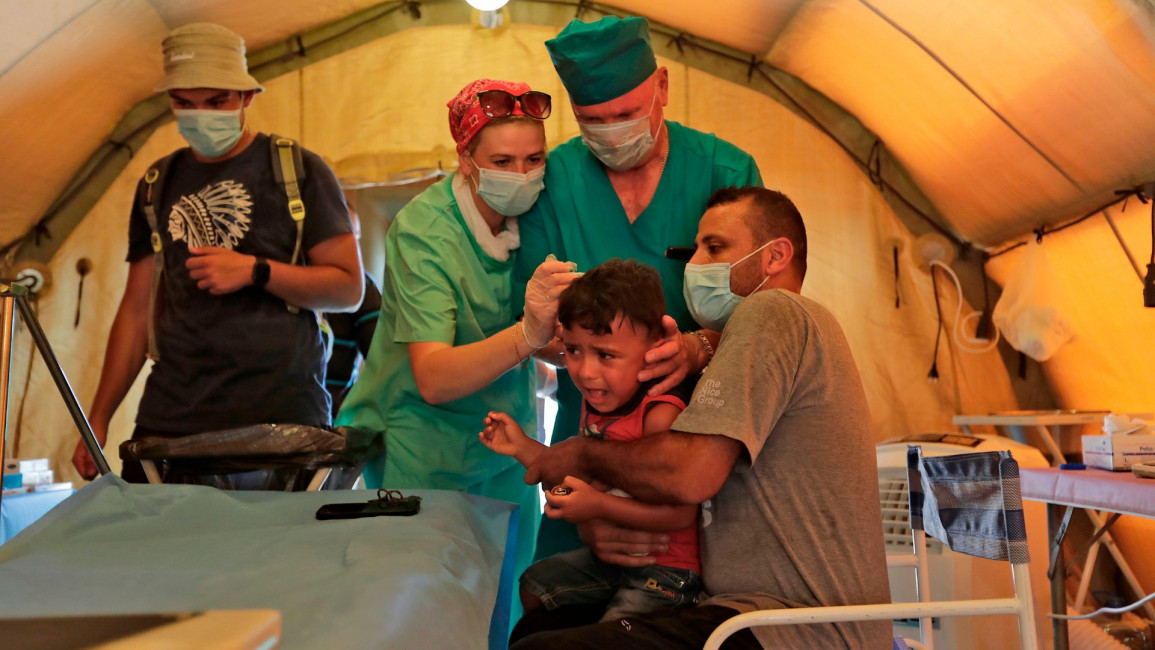Volunteers move mattresses for Beirut field hospital
Volunteers move mattresses for Beirut field hospital
Volunteers flooded to the city of Beirut in support and to help citizens following a deadly blast that killed over 150.
2 min read
Hospitals are working overtime to treat survivors [Getty]
Dozens of volunteers helped set up a field hospital in the Lebanese capital Beirut, as aid flows in from abroad to help residents cope with the impact of Tuesday's deadly blast.
Qatar has sent humanitarian aid, medical equipment and medicine to Beirut, according to the country's foreign ministry.
Several of Beirut's hospitals were damaged in the blast.
The explosion had caused major damage inside the building of the St. George University Hospital in Beirut's Achrafieh neighborhood and knocked out the electricity.
There was no "way to treat patients inside the hospital".
"Everything was shut down," said the Dr. Eid Azar, chief of staff at St. George Hospital.
"We are here, standing now at the site of the field hospital,” Dr Azar said.
“As of the second blast of last Tuesday, the hospital became completely dysfunctional. We evacuated 330 patients, we have ICU (intensive care unit) patients, COVID-19 patients, neonates, women delivering. So by 2:00 a.m., all patients were out because there was no more, neither electricity, nor any way to treat patients inside the hospital. Everything was shut down."
"We are installing a field hospital here. It's going to be 80 to 100 beds from what I understood, the medical team installing it is going to be here at 12:30. It is going to be with an ICU (intensive care) unit, medical care units, some clinics."
After the blast, staff at the hospital evacuated more than 300 patients including some infected with the coronavirus.
Dozens of injured were treated on the spot on the street outside the building, on stretchers and wheelchairs.
Rescue teams were still searching the rubble of Beirut's port for bodies on Friday.
The massive explosion sent a wave of destruction through Lebanon's capital, killing nearly 150 people and wounding thousands.
Qatar has sent humanitarian aid, medical equipment and medicine to Beirut, according to the country's foreign ministry.
Several of Beirut's hospitals were damaged in the blast.
The explosion had caused major damage inside the building of the St. George University Hospital in Beirut's Achrafieh neighborhood and knocked out the electricity.
There was no "way to treat patients inside the hospital".
"Everything was shut down," said the Dr. Eid Azar, chief of staff at St. George Hospital.
"We are here, standing now at the site of the field hospital,” Dr Azar said.
“As of the second blast of last Tuesday, the hospital became completely dysfunctional. We evacuated 330 patients, we have ICU (intensive care unit) patients, COVID-19 patients, neonates, women delivering. So by 2:00 a.m., all patients were out because there was no more, neither electricity, nor any way to treat patients inside the hospital. Everything was shut down."
"We are installing a field hospital here. It's going to be 80 to 100 beds from what I understood, the medical team installing it is going to be here at 12:30. It is going to be with an ICU (intensive care) unit, medical care units, some clinics."
After the blast, staff at the hospital evacuated more than 300 patients including some infected with the coronavirus.
Dozens of injured were treated on the spot on the street outside the building, on stretchers and wheelchairs.
Rescue teams were still searching the rubble of Beirut's port for bodies on Friday.
The massive explosion sent a wave of destruction through Lebanon's capital, killing nearly 150 people and wounding thousands.



